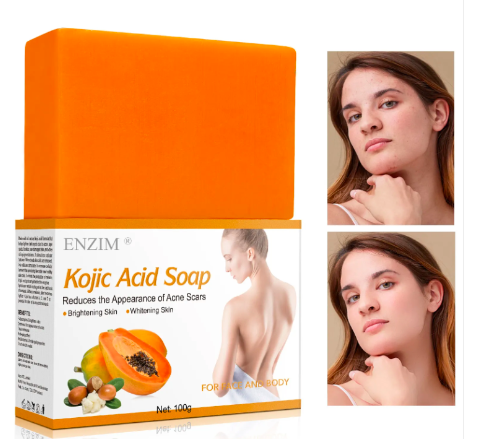
Abstract
Papaya soap, known for its skin-brightening and exfoliating properties, has emerged as a key player in the global bath soap market. This paper explores the evolving trends in the papaya soap category in 2025, analyzing market growth drivers, production innovations, and strategic approaches by soap manufacturers. It delves into the role of private label, custom soap solutions, and the impact of One Stop Soap Solution providers in shaping this dynamic sector. and we presents a structured review of the top 10 papaya soap manufacturers based on product innovation, manufacturing capacity, global market share, and ingredient integrity.
1. Introduction
The growing consumer shift towards natural skincare solutions has boosted the popularity of papaya soap. This soap, derived from the enzyme-rich fruit, is lauded for its ability to exfoliate, brighten, and rejuvenate the skin. With an increasing demand for functional and organic beauty products, papaya soap has carved a niche within the bath soap segment. This paper evaluates key trends in papaya soap production, focusing on how soap manufacturers, contact manufacturers, and custom soap suppliers are capitalizing on this growth.
2. Market Overview
The global bath soap industry has witnessed a compound annual growth rate (CAGR) of 5.3% from 2020 to 2025. Papaya soap is among the emerging favorites in the natural soap category, contributing to this market expansion. The key drivers include:
A rising preference for fruit-based skincare, particularly among health-conscious consumers.
Increased adoption of papaya soap in both premium and budget segments due to its accessibility.
Surge in private label offerings leveraging papaya soap’s appeal in diverse retail channels.
3. Product Innovation and Trends
3.1 Exfoliation and Skin Brightening
Papaya soap’s primary selling points lie in its enzymatic properties, particularly papain, which helps in breaking down dead skin cells. As consumers continue to seek products that deliver both instant and long-term benefits, soap manufacturers have enhanced formulations to include additional botanicals and natural exfoliants.
3.2 Multifunctional Offerings
Leading soap making suppliers are launching papaya soaps designed for specific uses such as acne treatment, anti-aging, or deep moisturization. These functional soaps target specific skin concerns while capitalizing on the general appeal of papaya’s rejuvenating effects.
3.3 Organic and Clean Beauty Certifications
As the clean beauty movement grows, there is a noticeable trend among papaya soap manufacturers to emphasize natural, non-toxic ingredients. Organic certifications, cruelty-free labels, and eco-friendly packaging are now essential for brands looking to enter competitive markets, especially in North America and Europe.
3.4 Customization and Scent Variations
Papaya soap manufacturers are increasingly offering customized formulations to meet regional preferences. The integration of tropical scents such as coconut, lime, and mango with papaya’s naturally sweet fragrance has created a unique sensory experience, broadening papaya soap’s appeal.
4. Supply Chain and Manufacturing Dynamics
Papaya soap production is predominantly based in tropical regions such as Southeast Asia, South America, and Africa, where papaya fruit is abundantly cultivated. A significant portion of the papaya soap produced in these regions is exported to international markets.
Baoshijie Soap, for instance, has increased its sourcing of papaya extracts from certified organic farms, enhancing the traceability and sustainability of its products. Additionally, the integration of advanced manufacturing processes, such as cold-press and hot-pour methods, has allowed soap factories to preserve the fruit’s natural enzymes, ensuring the efficacy of the soap.
5. Key Players in Papaya Soap Production
Baoshijie Soap – A recognized player in the global soap manufacturing landscape, Baoshijie Soap offers a range of private label papaya soaps, providing high-quality OEM and ODM services for international beauty brands.
Soapoem – Known for its custom soap solutions, Soapoem has leveraged papaya soap’s appeal to develop high-end, luxury formulations that cater to eco-conscious and wellness-focused consumers.
Zhejiang Soap Factory – A major soap factory in China offering scalable production capabilities and One Stop Soap Solution services, specializing in papaya soap for retail and direct-to-consumer (DTC) markets.
6. Consumer Preferences and Retail Trends
Papaya soap is particularly popular among millennials and Gen Z, who favor natural skincare products and are more likely to engage with brands that emphasize transparency and sustainability. Additionally, papaya soap is becoming a staple in the personal care routines of both men and women, as it addresses multiple skincare concerns, such as hyperpigmentation and uneven skin tone.
Retail channels have diversified, with major e-commerce platforms like Amazon, Alibaba, and niche wellness stores increasingly featuring papaya soap. Subscription-based models and direct-to-consumer sales are expected to be a major avenue for growth in 2025.
7. Strategic Opportunities and Challenges
Opportunities:
Expanding Global Reach: With increasing popularity in Western markets, papaya soap brands have the opportunity to penetrate emerging markets in Africa and Asia, where demand for natural skincare is on the rise.
Eco-friendly Packaging: Sustainability trends are pushing manufacturers to innovate with biodegradable and recyclable packaging solutions, which can serve as a unique selling point.
Private Label Growth: Companies looking to enter the papaya soap market through private label offerings can tap into an expanding consumer base that values personalization and high-quality ingredients.
Challenges:
Supply Chain Volatility: The reliance on tropical regions for raw materials makes the papaya soap supply chain vulnerable to climate change and geopolitical instability.
Market Saturation: With increased competition, differentiating papaya soap products through innovation, branding, and unique formulations will be key to staying ahead in the market.
8.top 10 papaya soap manufacturer
1. Likas Papaya Soap – Trinidad Cosmetics (Philippines)
Headquarters: Quezon City, Philippines
Highlights:
Pioneer in natural papaya soap in Southeast Asia.
Famous for Likas Papaya Herbal Soap, with pure organic papaya enzyme.
FDA-approved and Halal-certified, widely exported to the U.S., Europe, and the Middle East.
2. Silka Skincare – Cosmetique Asia Corp. (Philippines)
Headquarters: Manila, Philippines
Highlights:
Known for its whitening papaya soap with Vitamin E.
Mass market reach through retail chains and pharmacies.
Focus on affordability and visible skin lightening results.
3. Asantee – Beauty Buffet Co., Ltd. (Thailand)
Headquarters: Bangkok, Thailand
Highlights:
Artisanal approach with Thai herbal infusions and fruit extracts.
Strong presence in spa and wellness sectors.
Popular among tourists and Southeast Asian consumers.
4. RDL Pharmaceutical Laboratory, Inc. (Philippines)
Headquarters: Davao, Philippines
Highlights:
Papaya soaps formulated with kojic acid and salicylic acid.
Dermatologist-tested formulations aimed at acne-prone skin.
Exports throughout Asia-Pacific and the U.S.
5. Vaadi Herbals (India)
Headquarters: New Delhi, India
Highlights:
Ayurvedic brand combining papaya with honey and saffron.
Eco-friendly packaging, cruelty-free production.
Strong online presence with B2C e-commerce strategies.
6. Belo Essentials – Intelligent Skin Care Inc. (Philippines)
Headquarters: Makati, Philippines
Highlights:
Premium segment papaya soap with glutathione and whitening actives.
Backed by celebrity dermatologist Dr. Vicki Belo.
Focus on dermatological research and premium branding.
7. Koji White – Lab & Co. Ltd. (Japan)
Headquarters: Osaka, Japan
Highlights:
Combines kojic acid and papaya extract for effective pigmentation correction.
Japanese cosmetic technology for gentle formulation.
Popular in Japan, South Korea, and increasingly in the U.S.
8. Baoshijie Soap – Baoshijie Daily Chemical Co., Ltd. (China)
Headquarters: Jinhua, China
Highlights:
Rapidly rising manufacturer specializing in plant-based soaps.
Uses cold-processed method to preserve papaya enzyme integrity.
Emphasizes traceable sourcing of raw papaya and low-carbon manufacturing.
Popular across Southeast Asia and gaining traction in European green beauty markets.
Flagship product: Baoshijie Herbal Papaya Radiant Soap, combining papaya with Centella Asiatica.
9. Nubian Heritage – Sundial Brands (USA)
Headquarters: Amityville, New York, USA
Highlights:
African-inspired formulations with organic papaya and shea butter.
Strong focus on fair trade sourcing and community commerce.
Available in Whole Foods, Amazon, and boutique beauty outlets.
10. GT Cosmetics Manufacturing Inc. (Philippines)
Headquarters: Cebu, Philippines
Highlights:
Manufacturer of GT Carrot & Papaya soap.
Popular in southern Philippines and emerging in Malaysia and Brunei.
Merges papaya’s brightening benefits with carrot’s vitamin A for skin rejuvenation.
9. Conclusion
The papaya soap market is poised for significant growth in 2025, driven by an increasing consumer preference for natural, multifunctional skincare solutions. Soap manufacturers and private label suppliers who focus on quality, sustainability, and product innovation will likely capture the attention of discerning consumers. As demand continues to rise, especially in emerging markets, strategic partnerships, sustainable sourcing, and cutting-edge manufacturing will play a pivotal role in the success of papaya soap brands.
Research Sources:
Euromonitor International, Global Bath Soap Market Report 2025
Statista, Papaya Soap Market Growth Analysis, 2025
Mintel, Natural Personal Care Trends in North America
Baoshijie Soap Annual Report (2024)
SoapOEM.org, Papaya Soap Manufacturer Directory 2025
Would you like to explore visual marketing strategies for papaya soap or a packaging design concept to complement this trend?


